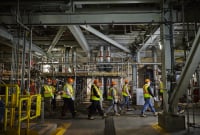Support strong Canadian climate journalism for 2025
If you follow Canadian climate politics, you might be feeling a sense of déjà vu. This year is kicking off much the way 2016 did, with a new federal minister of environment and climate change getting to work developing and brokering a climate change plan to deliver on ambitious new targets. Less than a month into the new year and Minister Steven Guilbeault and his colleagues are wrestling with two big questions:
- How will the government deliver on its promise to require pollution reductions from the oil and gas sector, and what scale of reductions will this deliver by 2030?
- What is the role of carbon capture, use and storage (CCUS), and how should the government encourage it?
In the last election, the Liberals campaigned on capping and reducing oil and gas emissions, a pledge that Prime Minister Justin Trudeau reiterated on the global stage following re-election. The federal government’s emission reduction plan, required under the Climate Change Accountability Act, is due by March 29 and will provide at least a ballpark estimate or range of expected reductions from the oil and gas sector out to 2030. Then the really hard work starts: moving swiftly to develop and implement robust — and constitutional — policies to get the job done.
The conventional approach is to offer a mix of carrots and sticks. But when it comes to delivering pollution reductions from the oil and gas sector, an aggressive push from the oil and gas lobby has the government focused on carrots. The industry’s demand? A federal tax credit that would see Canadian taxpayers shoulder 75 per cent of the sector’s carbon capture costs.
The federal government signalled in its 2021 budget that it was considering such a tax credit, and Natural Resources Minister Jonathan Wilkinson recently suggested the measure will likely be included in the 2022 budget, expected this April.
This led more than 400 experts to sign a letter urging the federal government “to not introduce the proposed investment tax credit for CCUS,” offering a range of arguments and evidence about the risks associated with CCUS and problems with a similar American tax credit.
In response, Clean Prosperity’s Michael Bernstein and clean energy policy consultant Ed Whittingham wrote a rebuttal in Canada's National Observer, countering that numerous expert assessments include an essential role for CCUS and concluding, “Put simply: Canada and the world need carbon capture in the toolkit to address climate change and meet international climate obligations.”
Both the academics and Bernstein and Whittingham raise valid concerns. We need to transition away from burning fossil fuels, which means winding down their production. But we are going to need CCUS to reduce emissions from existing oil and gas operations as they wind down, to address emissions from cement, chemicals and steel production, and to store CO2 removed from the atmosphere. As Bernstein and Whittingham write, “We are going to need all the tools in our toolkit, including carbon capture.”
But here we are debating the merits of whether or how to deliver the oil patch their carrot, with little discussion about the stick that needs to go with it.
If the federal Liberals learned anything from the “grand bargain” that required them to buy a pipeline to secure a national climate plan, it should be that the oil patch can be a fickle dance partner.
Rewind to the spring of 2019. The federal government was steadfastly holding up its part of the bargain: delivering cabinet approval to the TMX pipeline it had purchased and advancing the project, even in the face of significant opposition. Meanwhile, oil patch leaders and lobbyists were meeting privately with the Conservative Party of Canada “to map out strategy for ousting Justin Trudeau’s Liberals in a sign of growing collaboration between the Alberta-based sector and its political backers.”
Given this experience, why would the federal Liberals consider offering the oil patch its wished-for CCUS tax credit “carrot” before it has delivered its promised pollution reduction “stick?”
The federal government has options. It could deliver the CCUS tax credit as planned in the spring federal budget, but withhold eligibility for the oil and gas sector until a policy is complete to cap and cut its pollution, and rigorous criteria are in place to minimize the risk of stranded assets. Or it could hit pause on the tax credit altogether, and consider other policy approaches to achieve the same outcome.
Capping and cutting oil and gas pollution, the role of CCUS, and the offer of government support are fundamentally intertwined. How aggressive the pollution cuts can be is a function of how generous the support is. Learning from the past, it’s clear the stick and carrot ought to be a package deal.






Comments
I can't help but try to remember the last time I (or anyone I know) was offered "carrots" for obeying the law.
The oilcos are like the "convoy" participants: they have no intention of moving one millimetre beyond what they can get away with.
And right now, they're getting away with murder. Literally.
And government is behaving as BS helplessly as the police in Ottawa.
Government is in bed with big oil, and it sure as heck looks like the police have some extreme right-wing sympathies themselves.
From the article: "But we are going to need CCUS to reduce emissions from existing oil and gas operations as they wind down, to address emissions from cement, chemicals and steel production, and to store CO2 removed from the atmosphere."
This is mostly untrue. Let's talk opportunity costs. We are only going to spend so many dollars on the transition to a zero-carbon economy, and even if we were prepared to spend however many dollars it takes, we would still not want to spend more dollars than we need for a given result. So the question is, for any given chunk of dollars, what's the most effective way to spend it? And the answer in almost all cases is, not on carbon capture.
So for instance, concrete and steel. Yes, use of CO2 is almost literally baked in to the main current technologies for making those things. However, there are new technologies for both which don't use CO2. We are going to need to shift to doing them in non-CO2-using ways at some point. Should we spend a bunch of money redundantly on carbon capture as a stopgap until we change over? No, that's stupid, we'd end up spending a bunch of money twice. It would be much smarter to spend as much of the money as is feasible on developing and implementing the new technologies at scale, and if initially you can only spend so much money on pilot projects and research so you have money you might have spent on carbon capture left over, you spend that extra money on solar/wind farms or electric car subsidies or any of the thousand other things that need doing. Then, when you're ready to fix concrete and steel PROPERLY, you spend the money you need to do that. Carbon capture is just a way of spending more money for nothing much.
And that's if it worked, and/or had reasonable enough costs to be theoretically worth implementing. But it doesn't do either.
Using CCS for the oil industry itself is just throwing more money at an industry we have to end. Spend the money on bringing in the replacements, not on delaying them.
"In response, Clean Prosperity’s Michael Bernstein and clean energy policy consultant Ed Whittingham wrote a rebuttal in Canada's National Observer, countering that numerous expert assessments include an essential role for CCUS and concluding, “Put simply: Canada and the world need carbon capture in the toolkit to address climate change and meet international climate obligations."
Disingenuous argument from corporate environmentalists and longtime fossil-fuel industry collaborators. CCUS will be essential in industrial sectors that are difficult to decarbonize. Processes like steel and cement. Not for the fossil fuel industry, where energy alternatives are readily available.
Used to extend fossil fuels' lifetime, CCUS will result in more emissions, not less.
Capturing upstream operations in oil & gas operations does nothing to reduce the 80–90% of emissions generated from a barrel of oil downstream at the consumer end. CCS does not capture other fossil fuel pollutants.
*
No carrots required. Carbon pricing is supposed to make it more expensive to emit carbon. Carbon pricing is intended to discourage fossil fuel production and consumption — and make the alternatives more attractive.
CCS subsidies relieve industry of the costs of reducing emissions. Making it cheaper and more profitable to produce and sell fossil fuels. Self-defeating. These savings go straight to the company's bottom line. Into shareholders' pockets.
Canada's federal and provincial governments not only shield heavy emitters from effective carbon pricing, but also subsidize carbon-cutting measures like carbon capture and storage. Undermining the rationale for carbon pricing. Violating the polluter-pay principle. Leaving taxpayers on the hook for costs industry (and consumers) should be paying for.
Ottawa boasts about climate leadership, but sabotages its own carbon pricing policy.
What we have yet to hear from anybody is a rational argument to abrogate the polluter-pay principle and stick taxpayers with industry's bills for emissions reduction, cleanup, and reclamation.
Why invest scarce public resources in CCS, when there are far more cost-effective climate solutions available? Cheaper ways to cut more emissions. CCS is hugely inefficient, highly energy-intensive, and expensive. Captures a tiny fraction of emissions — only from large emitters. Huge opportunity costs.
Invest the same scarce resources in public transit, energy efficiency and conservation, building retrofits, smart urban design, and renewables, and we can cut far more emissions.
If CCS is effective, efficient, and economic, let industry pay for it. An industry raking in billions of dollars in profits does not need taxpayer help.
Should taxpayers be forced to foot the bill for oil and gas sector’s carbon capture plans? Only of we get to own shares and receive profits from the companies who do get subsidies, otherwise - no.
Absolutely not. Tax money should not be needed. If carbon capture and storage is in any way viable, let the most profitable industry on earth pony up and get on with showing us how well it works.
I don't believe it would every pay for itself.......and I do believe it will waste time, resources and public money....functioning primarily as one more delay tactic. While we wait for this latest version of white elephant to be built, the Fossil Fools will ramp up in situ mining of bitumen, fracking of tight gas....and if Crazy Kenney has his way, open pit mining for coal.
It's a scam......let the scammers prove otherwise on their nickle.